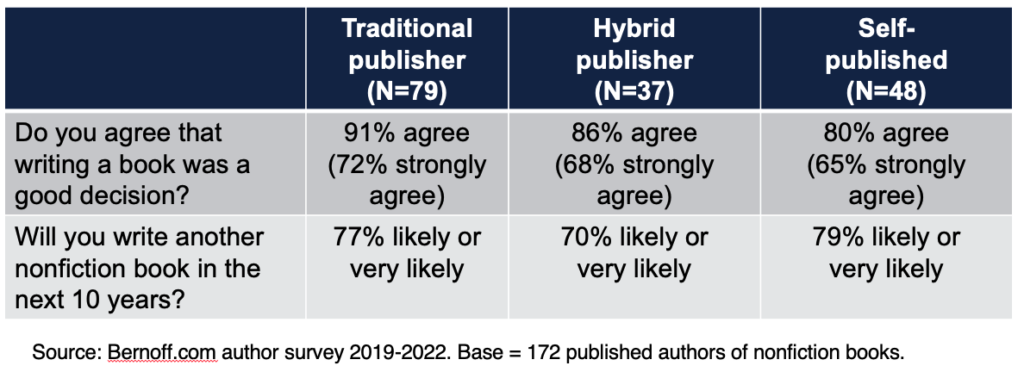Nonfiction authors are happy
Over the next six weeks, I’ll be sharing data from the 2019-2022 survey I did of 242 nonfiction authors, 172 of which had completed publishing a book. I’ll share information about the struggles they had, the challenges they found most difficult, and the tools they used. But today I’m going to start at the very top line: were they happy they wrote a book?
Even though authors complain, they are generally happy to be authors
My published authors answered the question, “Do you agree that writing a book was a good decision?” They also responded to the question, “Will you write another nonfiction book in the next 10 years?” (The first question was rated on a 5-point scale from strongly agree to strongly disagree, and the second on a 5-point scale from very likely to very unlikely.)

Traditionally published authors were more likely to agree that writing a book was a good decision, perhaps since they got paid advances. But even among self-published and hybrid published authors, more than 80% agreed that writing a book was a wise move.
Of course, anyone who’s put a year of effort into a book is perhaps biased to believe it was worth it. But given the very high proportion who are planning to write another book, it seems as if these authors are happy.
Why authors are happy
I’ve seen more than my share of frustration and disillusionment among authors. But the fact is, they generally aren’t sitting around fantasizing that a book will make them rich and famous. Their goals are, in general, more modest. And for the most part, they accomplished those goals. Here’s a table from my book:

As you can see, authors are driven more than anything else by a need to share their knowledge. And nearly all of the 75% of authors who had that goal say that they accomplished it. They also were likely to succeed on goals like boosting their reputations, and getting more speaking opportunities. Among the 30% hoping to generate leads and the 27% hoping to profit from book sales, fewer accomplished their goals. Those concrete monetary goals are a bit harder to accomplish. But even there, more than two-thirds did what they set out to do.
What this means for you as an author
It’s certainly possible that my survey is biased towards successful authors — that those who were frustrated didn’t feel like filling in the forms about their negative experiences. But in my experience with 50 book projects, authors are not really having pie-in-the-sky dreams and while they complain about everything, they still enjoy being authors. They have something important to say, and a book is the way they get to say it. It is a hard and challenging task to write a nonfiction book, with many pitfalls along the way, but if you get to the end, you have accomplished something worthwhile — you have created a (hopefully) rich and coherent set of content that never existed before. And even if the process is hard and the result imperfect, that is a satisfying feeling to have.
With multiple publishing models available now, the main obstacle to authors is themselves. Can they refine their ideas, structure their content, put their butts in the seat, and power through to the end?
The message here is that if an author has realistic goals, they are likely to accomplish them, and feel good about the result. If this is you, take heart. Success is possible. Hundreds of authors that I surveyed agree. They may not be selling a million copies or speaking in front of thousands of people, but they are sharing their stories and creating influence. And in the end, a book is a worthwhile way to do that.
(If you’re interested in the survey results in context, including case studies from over 20 authors, that’s all in my next book, Build a Better Business Book, which you can preorder right now for delivery next month.)